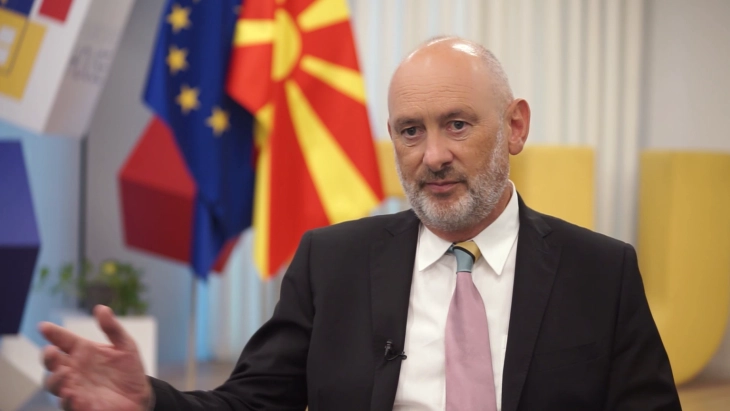Geer: Thorough media reform necessary to resist fake news and disinformation
- North Macedonia is at a very important stage of its EU accession process, but the process must be accelerated. Thorough reforms are important not only because they are conditions, but also be

Skopje, 25 January 2023 (MIA) – North Macedonia is at a very important stage of its EU accession process, but the process must be accelerated. Thorough reforms are important not only because they are conditions, but also because they help build a resistant and competitive society that responds to the citizens’ needs and protects their fundamental rights, including their freedom of expression and access to information, said EU Ambassador David Geer on Wednesday.
Ambassador Geer spoke at the public presentation of the EU project “EU for Freedom of Expression: Alignment of National Media Legislation with the EU Acquis and Media Standards”
The media, Geer added, play an important role in providing the public with accurate information on important issues, and on the EU accession process.
“This is very important especially in the context of the massive sources of fake news. The officials, together with the media and the civil sector, must promote media literacy, thereby building resistance to fake news and disinformation,” said the EU Ambassador, stressing that the work of the media must be protected and strengthened.
He urged all politicians and policymakers to respect the role of the media, thus ensuring they can work without any pressure.
“If the goal of harmonizing the national legislation with the EU’s Audiovisual Media Services Directive by May 31 is not achieved, then North Macedonia will lose access to the program and lose the opportunity to use the services of Creative Europe,” said Geer.
Regarding the project, the EU Ambassador said it demonstrates the Union’s firm commitment to the freedom of expression and the freedom of media as a fundamental value in the EU member states, the future member states and on a global level. The EU’s project, he added, will also include an analysis of the market and recommendations for legal solutions and policies aimed at improving pluralism and sustainability. Furthermore, recommendations will be given for various regulatory mechanisms which will help with the challenges faced by the traditional and online media.
Minister of Information Society and Administration Admirim Aliti underscored the necessity of the media reform and pointed to the Ministry’s project, carried out in coordination with the EU Delegation, and aimed at harmonizing the national media legislation with the EU acquis and media standard.
“This is a comprehensive project that should deliver a full harmonization of the Law on Audio and Audiovisual Media Services with the 2018 EU Audiovisual Media Services Directive. The reforms should be carried out continuously, they shouldn’t end with one or two projects, they are a living process that grows and is constantly upgraded,” said Aliti.
According to the Minister, the society needs a powerful public broadcasting service that will perform its basic role to inform and educate, and one that is free from the influence of the political centers of power. Additionally, said the Minister, we need a strong and independent regulatory body that will proactively monitor the situation in the media.
“I expect all stakeholders to come up with solutions and ideas for all these challenges in the coming period,” said Aliti.
Minister of Culture Bisera Kostadinovska-Stojchevska stressed that freedom of expression is one of the greatest values of the modern, democratic society and a key element of the country’s EU integration process. The project, according to her, is direct assistance and support from the EU for faster harmonization of the Macedonian legislation with the EU directive – strengthening the institutional capacity, as well as ensuring the independence of the national media regulatory body. ad/ik/